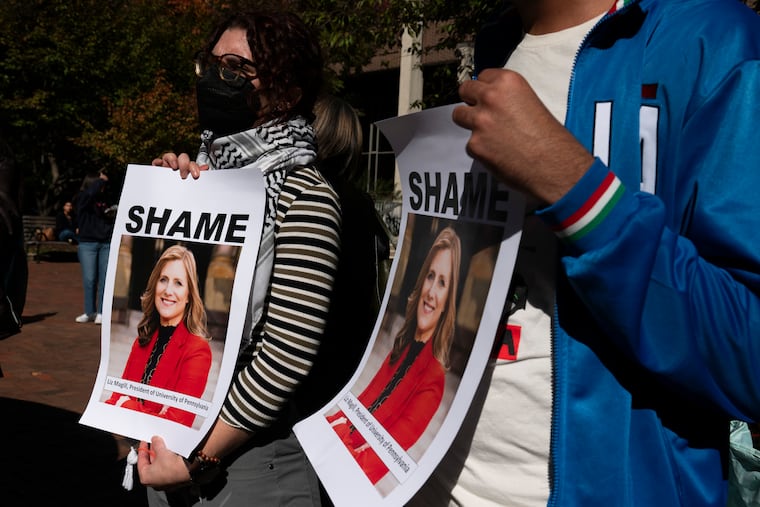Jewish donors and allies’ letters to Penn expose the moral rot in American higher education
The only surprising thing about these donors’ actions is that they seem genuinely surprised that antisemitism and anti-Western values have been normalized at America’s most elite institutions.

In the past two weeks, several Jewish megadonors and their allies have thunderously announced that they are pulling financial support from their alma mater, the University of Pennsylvania. The donor letters that have been made public thus far eviscerate Penn president Liz Magill and other university leaders for failing to condemn the Oct. 7 attacks by Hamas on Israeli civilians as terrorism.
The letters illuminate Magill’s apparent struggle to clarify the university’s position on antisemitism after four Penn departments sponsored a shocking number of antisemitic speakers at the Palestinian Writes festival on campus in late September, just weeks prior to the terrorist attacks in Israel.
One of the outraged donors pulling their support was Penn alumnus and billionaire donor David Magerman, a computer scientist and philanthropist. Magerman excoriated Penn’s “misguided moral compass.” He was joined by Penn alumni Cliff Asness of AQR Capital Management, Marc Rowan of Apollo Global Management, Law & Order creator Dick Wolf, former U.S. diplomat and businessman Jon Huntsman, and president of the World Jewish Congress, Ronald Lauder. These Penn donors are part of a growing cadre of billionaires who are pulling their money from America’s most vaunted colleges and universities after realizing there is a moral rot in higher education.
The only surprising thing about these donors’ actions is that they seem genuinely shocked that antisemitism and anti-Western values have been normalized at America’s most elite institutions.
When many of these donors were on campus, Penn, Harvard, and other universities of their ilk were likely still redoubts of classical liberalism, a doctrine that holds that deepening an understanding of individual rights, free enterprise, the rule of law, and civil liberties are the most important functions of higher education. Liberal arts institutions were also meant to teach young minds to approach competing ideas with tolerance and openness.
Yet today, Penn is clearly failing at instilling in its students the sense of morality that goes hand in hand with a liberal arts education. (This form of liberalism, it is important to note, does not have the same meaning as the liberal-conservative typology that it’s easy to conjure with these words.)
What is morality in a classical liberal context? Russian writer and Soviet dissident Aleksandr Solzhenitsyn answered this question in The Gulag Archipelago, first published in 1973. Solzhenitsyn, a decorated Soviet commander, was imprisoned in a Russian forced labor camp after privately criticizing Stalin. In the labor camp, he saw that “the line separating good and evil passes not through states, nor between classes, nor between political parties either — but right through every human heart.”
Not every political system or university or institution that Western civilization has wrought has been uniformly good or devoid of evil. Rather, liberalism equipped society with the ability to judge the morality of actions by understanding that it is within each person’s ability to decide to do good or evil, rather than become good or evil through a political or economic system.
Today, universities like Penn have upended this liberal tradition. The growing illiberalism of the American academy has given refuge to groups sympathetic to organizations like Hamas and Hezbollah.
This point was brought home to me on a private Zoom call last week with young Israelis who were talking about ways to support their country in this time of war. One member of the Israel Defense Forces said the Hamas attacks were not just against Jews and Israel, but against Western civilization itself.
That young man now has to put on a uniform to defend his country and to stop Hamas, a group that, since its founding charter in 1988, has called for the destruction of Israel and the annihilation of the Jewish people who live there.
That Hamas continues its reign of terror is not a surprise. What is surprising is that so many leaders at elite institutions like Penn turned a blind eye for decades toward the fact that support for terroristic and anti-Western groups like Hamas was embedded in their institutions.
As University of Pennsylvania professor Ezekiel J. Emanuel wrote in the New York Times last week, “Those of us who are university leaders and faculty are at fault. We may graduate our students, confer degrees that certify their qualifications as the best and brightest. But we have clearly failed to educate them. We have failed to give them the ethical foundation and moral compass to recognize the basics of humanity.”
In this moment, when the basic tenets of Western civilization are at stake both domestically and abroad, we must put aside partisan bickering here in America to peacefully unite in confronting this moral rot within higher education.
There is no simple reform to end decades of degradation. But the public denunciation of these immoral actions — and defunding the institutions whose leaders are party to them — is the right place to start.